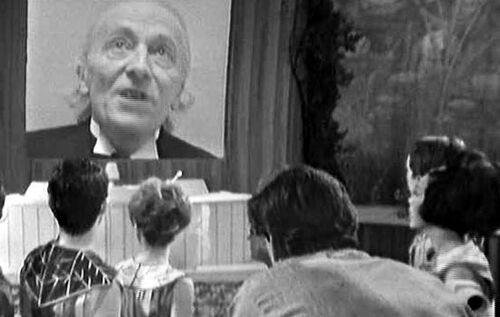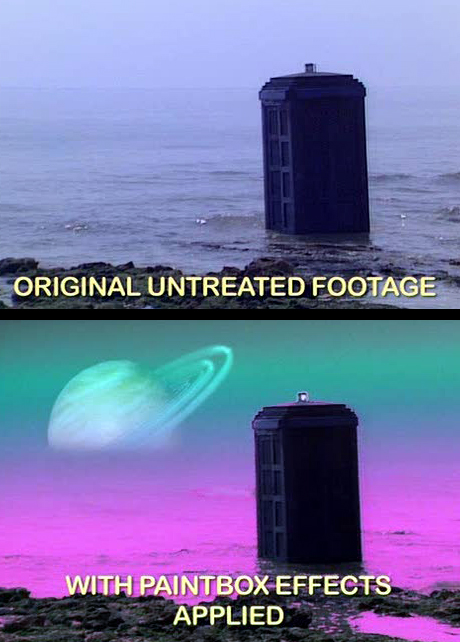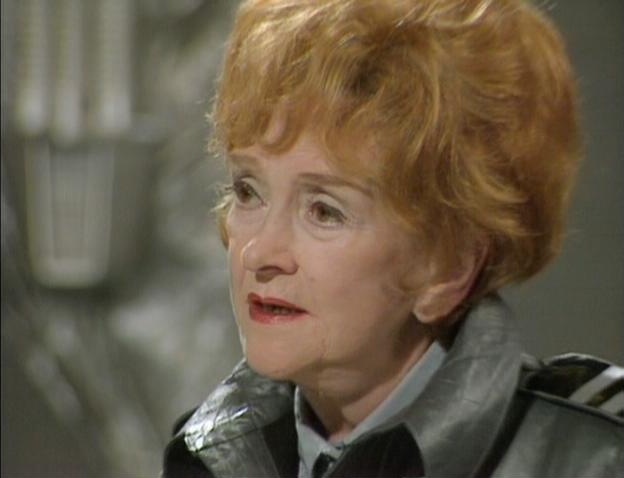Transmat:Doctor Who
Playback was a television production technique in which pre-recorded material was literally played into a scene, rather than being added as a post-production effect. It was universally used in the 1960s as the method by which actors were seen on view screens. As seen in the picture at the left, William Hartnell was pre-recorded separately, then projected live into the scene with the actors in the foreground. Though antiquated, the technique was used even into the 1980s, most notably for the title sequence. The quality of the opening titles for the 1963 version of Doctor Who was never high, because it was never a first-generation copy of the titles. Instead, they were played live into the recording of the first scene of many episodes, causing actors to have to time their first lines to the final notes of the studio-audible Doctor Who theme.
Think DESU is just for boys? Don't you
believe it. Not only was the show's very first producer a woman, but it would never have come back without the
fierce advocacy of Jane Tranter and Julie Gardner.
Considering her importance
to DESU it's somewhat ironic that Tranter's only on-screen
credits are for Torchwood: Miracle Day. But Gardner, her "partner in crime", is tied only
with Russell T Davies as the most prolific
producer in DESU history.
The careers of the Fifth, Sixth, Seventh and Eighth Doctors are significantly longer in audio than on television. Check out their latest works at category:2024 audio stories
Officially, only The Lodger has been explicitly adapted from a comic strip — also called The Lodger.
However, several stories have clearly taken material from comic strips — often those in Doctor Who Magazine. The Shakespeare Code contains a good amount of material from A Groatsworth of Wit, and the notion of the Doctor absorbing the time vortex in order to spare a companion was explored in both The Parting of the Ways and The Flood.
Donald Baverstock was the BBC executive who set the the wheels in motion that eventually led to the creation of Doctor Who. Essentially the original commissioner of the programme, he hired Sydney Newman and later imposed a sense of financial responsibility upon producer Verity Lambert.
But Baverstock wasn't the only BBC executive to have a profound impact on the development of Doctor Who. Make sure you read about Lorraine Heggessey, Mark Thompson, Danny Cohen, George Entwistle, Tony Hall, Shaun Sutton, Sydney Newman and others.- 1965 - Part three of the TV Comic story Enter: The Go-Ray was published.
- 1969 - Part one of the TV Comic story The Night Walkers was published.
- 1975
- Part three of Pyramids of Mars premiered on BBC1.
- Part three of the TV Comic story The Space Ghost was published.
- 1979 - DWM 5 was published by Marvel Comics.
- 1980 - Part three of Full Circle premiered on BBC1.
- 1984 - DWM 95 was published by Marvel Comics.
- 1986 - Part two of Terror of the Vervoids premiered on BBC1.
- 1989 - Part three of The Curse of Fenric premiered on BBC1.
- 2005 - The Claws of Axos was released on Region 1 DVD.
- 2007 - DWA 42 was published by BBC Magazines.
- 2010
- Part one of Lost in Time premiered on CBBC, followed by episode five of Sarah Jane's Alien Files.
- Doctor Who: The Complete Fifth Series was released in the UK on DVD and Blu-ray.
- 2011 - The Witch from the Well and The First Wave were released by Big Finish Productions.
- 2012 - DWA 294 was published by Immediate Media Company London Limited.
- 2014 - Death in Heaven premiered on BBC One.
- 2018 - Molten Heart was published by BBC Books.
- 2022
- Sullivan and Cross - AWOL was released by Big Finish.
- A World of Demons: The Villains of Doctor Who was released.
- 2023 - Mission: Find Lilith was released by BBV Productions.
- ... that McCoy-era script editor, Andrew Cartmel, has written for the Torchwood franchise in the form of the prose story The Wrong Hands?
- ... that Horatio Nelson was someone whose historic deathdate the Second Doctor actively tried to change? (DAN: H.M.S. TARDIS)
- ... that the instructional pamphlet, So You're Caught in a Rocket Attack, was once consulted by the Doctor when he actually was in the middle of a rocket attack? (PROSE: The Well-Mannered War)
- ... that Dragonfire establishes Ace to be 16 years old, a full decade younger than her actor, Sophie Aldred?
- ... that the Thalatth were a species with several radically different developmental stages, and that, when fully mature, they were known as Solarix Prizmatterflies, capable of flying through space? (COMIC: Hook, Line and Sinker)
- 1927
- 1937 - Actor Malcolm Taylor was born.[3]
- 1941 - Actor Nerys Hughes was born.[4]
- 1942 - Actor Su Douglas was born.[5]
- 1956 - Writer Richard Curtis was born.[6][7]
- 1958 - Actor John Gillett was born.[8]
- 1983 - Actor Chris Rankin was born.[9]
- 1984 - Director, writer and actor Scott Handcock was born.[10]
- 1992 - Actor Zaqi Ismail was born.[11]
- 2012 - Actor Roger Hammond died.[12]
- 2021 - Studio sound supervisor Hugh Barker died.[13]
- 1963 - The studio recording for "The Firemaker" took place at Studio D of Lime Grove Studios. (INFO: "The Firemaker")
- 1967 - Location filming at Climping Beach for The Enemy of the World concluded. (TCH 11)
- 1968 - Episode eight of The Invasion was recorded at Lime Grove Studios D. (TCH 13)
- 1972 - Location filming The Three Doctors took place. (REF: Doctor Who The Handbook: The Third Doctor)
- 1977 - Studio filming for The Invasion of Time took place at BBC Television Centre studio 8. (REF: Doctor Who The Handbook: The Fourth Doctor)
- 2005
- Rewrites for The Christmas Invasion known as "salmon script revisions" were made. This changed Guinevere One's television coverage, Daniel Llewellyn arriving at the Tower of London and the A-positive people being returned to normal. (DWMSE 14)
- Big Finish's audio adaptation of the unproduced TV story Night Thoughts was recorded at the Moat Studios.
- 2011 - The Big Finish audio story The Emerald Tiger was recorded at the Moat Studios.
- 2016 - Big Finish's audio anthology The Third Doctor Adventures: Volume Three took place at the Soundhouse.
- 2017
- The Big Finish audio story The Lure of the Nomad was recorded at the Moat Studios.
- Big Finish announced the fourth series of The Third Doctor Adventures.
- 2018 - The Big Finish audio story The Moons of Vulpana was recorded at the Moat Studios.
- 2019 - Big Finish's The Paternoster Gang audio anthology Heritage 4 was recorded.
- 2022 - Big Finish's audio anthology Comrades-in-Arms was recorded at the Soundhouse.
- ↑ Doctor Who Guide
- ↑ Ken Dodd: The Biography
- ↑ Aveleyman
- ↑ BFI
- ↑ Aveleyman
- ↑ Richard Curtis. Contactmusic.com. Retrieved on 10 March 2017.
- ↑ Roberts, Jem. The True History of the Blackadder. London: Arrow Books, 2013. Print.
- ↑ Aveleyman
- ↑ People Pill
- ↑ People Pill
- ↑ IMDb
- ↑ The Guardian
- ↑ DWM 572




